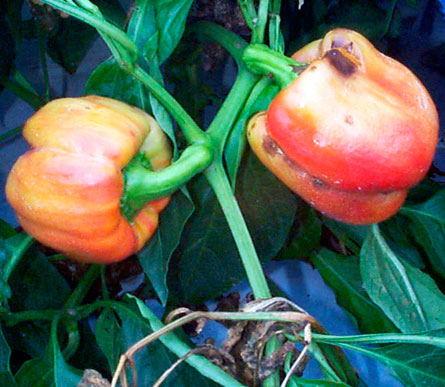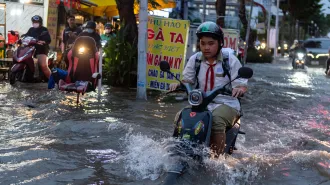A plant virus might edge out the better-known E. coli bacterium as a signpost for waters polluted by human waste. The pepper mild mottle virus is widespread in raw sewage, treated wastewater and seawater exposed to wastewater, reports a new study in the November Applied and Environmental Microbiology.

Sampling for the pepper virus could be a new means of tracking human pollution that can spread to coral reefs and other sensitive ecosystems, says study coauthor Mya Breitbart of the University of South Florida in St. Petersburg. And if the virus can be correlated with disease risk, it may allow a faster determination of whether or not a beach should be closed than is possible using current methods, Breitbart says.
The common method for testing waters is to plate the water sample and see which bacteria grow, which often takes 24 hours. “There’s always this lag,” says Breitbart. “It’s the classic ‘the beach should have been closed yesterday.’” A quick and cheap genetic test could identify viruses on the spot.
Scientists still need to figure out whether the presence of pepper mild mottle in dirtied waters is a good indicator of the potential for swimmers to get sick.
It appears to be a good indicator of human pollution: Previous work by Breitbart and colleagues found the pepper virus in concentrations of 1 million to 1 billion viruses per gram of dry raw sewage. The virus is harmless to people but can be a pathogen in hot, bell and ornamental peppers, which are used in sauces, salsas and curries. The virus makes its way into human waste through food.
Most viruses are just along for the ride in various hosts and are not necessarily harmful, says Bryce Falk of the University of California, Davis, who was not involved in the work. This suggests that some viruses may make a good proxy for human waste.
Pepper mild mottle virus is one in a group of known toughies, the tobamoviruses. Extraordinarily stable, this group of rod-shaped viruses includes the tobacco mosaic virus, which reportedly was still infectious after being shot 149 kilometers into the sky on the surface of a rocket and has been found in glacial ice thousands of years old.
The pepper virus was detected in raw sewage and treated wastewater in all 12 states from which the study sampled. The virus was also in Atlantic and Pacific coastal waters near discharge sites, but not in the Gulf Coast sample. The study also found that the pepper virus seems to persist in contaminated waters for about a week.
The pepper virus is much more abundant in raw sewage than are viruses that can make people sick, the team reports. So it might be a good frontline indicator of a recent contamination event. But it was also present in some seagull and chicken fecal samples. So a testing toolbox that allows screening for the pepper virus and perhaps a few other species may be the best approach, says Breitbart.
A second study, also out of Breitbart’s lab, reports that relatives of the pepper virus also persist in reclaimed water. This treated water is an important part of water conservation, noted Breitbart, because it supplies water for agriculture, fountains and other nondrinking uses. The survey of viral genetic material in reclaimed water sampled in Florida turned up many other plant viruses and several genetic sequences that were similar to known insect and bacterial viruses. But few viruses pathogenic to humans appeared, the researchers note in the November Environmental Microbiology. It isn’t known whether the viruses found in reclaimed water are infectious.
“Pretty much any environment we go into we find a lot of new viruses; it is an unknown genomic pool,” Breitbart says. “We’re just starting to chip away at what types there are and what environments you find them in.”






